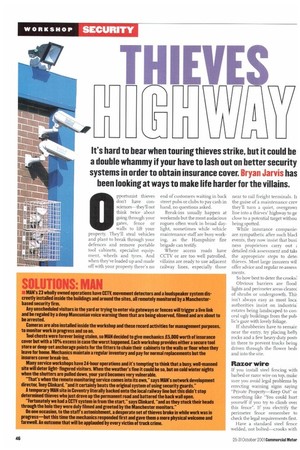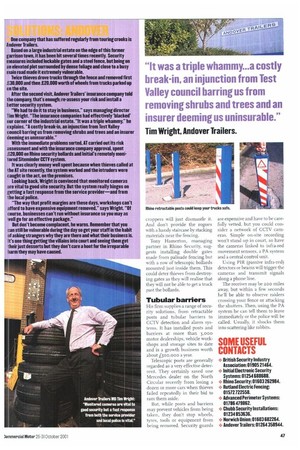It's hard to bear when touring thieves strike, but it
Page 46

Page 47

If you've noticed an error in this article please click here to report it so we can fix it.
could be a double whammy if your have to lash out on better security systems in order to obtain insurance cover. Bryan Jarvis has been looking at ways to make life harder for the villains.
pportunist thieves don't have consciences—they'll not think twice about going through your gates, fence or walls to lift your property. They'll steal vehicles and plant to break through your defences and remove portable tool cabinets, specialist equipment, wheels and tyres. And when they've loaded up and made off with your property there's no end of customers waiting in back street pubs or clubs to pay cash in hand, no questions asked.
Break-ins usually happen at weekends but the most audacious rogues often work in broad daylight, sometimes while vehicle maintenance staff are busy working, as the Hampshire fire brigade can testify.
Where access roads have CCTV or are too well patrolled, villains are ready to use adjacent railway lines, especially those near to rail freight terminals. h the guise of a maintenance crey they'll turn a quiet, overgrow/ line into a thieves' highway to ge close to a potential target withou being spotted.
While insurance corn paniei are sympathetic after such blacl events, they now insist that busi ness proprietors carry out detailed risk assessment and tak( the appropriate steps to detei thieves. Most large insurers wil offer advice and regular re-assess ments.
So how best to deter the crooks: Obvious barriers are flood. lights and perimeter areas clear& of shrubs or undergrowth. This isn't always easy as most loci authorities insist on industria: estates being landscaped to conceal ugly buildings from the pub. lic's gaze with lovely foliage.
If shrubberies have to remain near the entry, try placing hefty rocks and a few heavy-duty posts in there to prevent trucks being driven through the flower beds and into the site.
Razor wire
If you install steel fencing with barbed or razor wire on top, make sure you avoid legal problems by errecting warning signs saying "Private Property—Keep Out" ox something like "You could hurt yourself if you try to climb over this fence". If you electrify the perimeter fence remember to check the legal requirements first.
Have a standard steel fence welded, not bolted—crooks with croppers will just dismantle it. And don't provide the rogues with a handy staircase by stacking materials near the fencing.
Tony Hamerton, managing partner in Rhino Security, suggests installing double gates made from palisade fencing but with a row of telescopic bollards mounted just inside them. This could deter thieves from destroying gates as they will realise that they will not be able to get a truck past the bollards.
Tubular barriers
His firm supplies a range of security solutions, from retractable posts and tubular barriers to CCTV detection and alarm systems. It has installed posts and barriers at more than 3,000 motor dealerships, vehicle workshops and storage sites to date and is a growth business worth about L3oo,000 a year.
Telescopic posts are generally regarded as a very effective deterrent. They certainly saved one Mercedes dealer on the North Circular recently from losing a dozen or more cars when thieves failed repeatedly in their bid to ram them aside.
But, while posts and barriers may prevent vehicles from being taken, they don't stop wheels, tyres, tools or equipment from being removed. Security guards are expensive and have to be carefully vetted, but you could consider a network of CCTV cameras. Simple on-site recording won't stand up in court, so have the cameras linked to infra-red movement sensors, a PA system and a central control unit.
Using PIR (passive infra-red) detectors or beams will trigger the cameras and transmit signals along a phone line.
The receiver may be 200 miles away, but within a few seconds he'll be able to observe raiders crossing your fence or attacking the shutters. Then, using the PA system he can tell them to leave immediately or the police will be called. Usually, it shocks them into scattering like rabbits.












































































































































